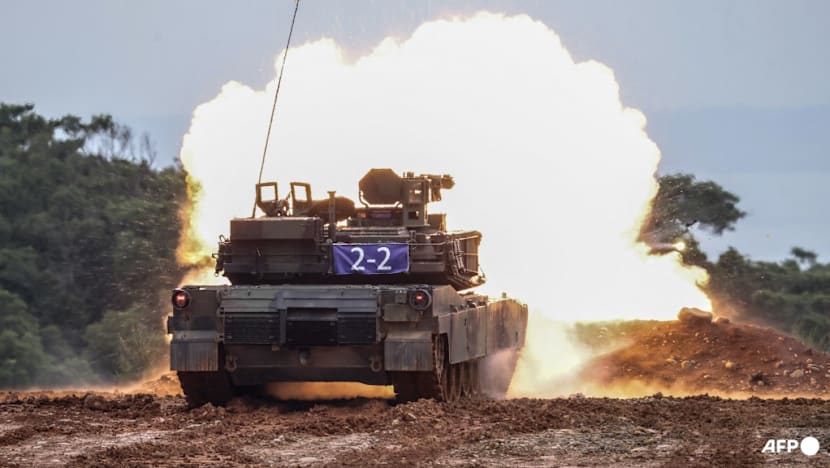Politics
Taiwan Plans US$33 Billion Defence Upgrade Amid China Tensions

Taiwan’s defence ministry is set to pursue a historic funding initiative of up to US$33 billion to enhance the island’s military capabilities in response to escalating threats from China. This revelation comes from Wang Ting-yu, a senior lawmaker affiliated with President Lai Ching-te‘s ruling Democratic Progressive Party. The proposed budget aims to solidify Taiwan’s defence against what many perceive as an increasing likelihood of military aggression from Beijing.
As military pressure from China intensifies, Taiwan has prioritized the enhancement of its defence spending in recent years. The proposed special budget, which ranges from NT$800 billion to NT$1 trillion (approximately US$26 billion to US$33 billion), is intended to be allocated over a seven-year period. Wang noted that the final amount will be determined after Taiwan’s negotiations with the United States on potential arms sales are finalized.
Plans for Comprehensive Defence Upgrade
Wang emphasized the necessity of creating a robust defence framework to protect Taiwan. He described the initiative as a “huge” upgrade to the island’s self-defence capabilities. The plans include integrating Taiwan’s air defence systems, acquiring advanced technology to detect threats such as drones and missiles, and increasing the island’s capacity to produce and stockpile ammunition for wartime scenarios.
Taiwan faces constant threats from China, which asserts that the self-governing island is part of its territory and has consistently indicated a willingness to use force to achieve reunification. Wang pointed out the advancements in China’s military technology, specifically referencing the development of fifth-generation fighters and stealth technology across various platforms. He highlighted the need for Taiwan to enhance its detection capabilities, stating, “If you cannot detect it, all kinds of fire units are useless.”
Negotiations with the United States and Legislative Challenges
Taiwan’s government is also engaged in trade negotiations with the United States, particularly concerning the reduction of tariffs imposed during President Donald Trump‘s administration. Wang expressed hope that the proposed defence budget would demonstrate Taiwan’s commitment to bolstering its military capabilities, which are significantly outmatched by China’s firepower.
Last month, the Taiwanese government announced its plans to elevate the 2026 defence budget to NT$949.5 billion, exceeding three percent of the country’s gross domestic product (GDP). The objective is to increase defence spending to five percent of GDP by 2030. When questioned about the potential influence of the special defence budget on trade discussions, Wang affirmed, “Yes.”
The defence ministry declined to provide comments following inquiries regarding the budget. Before the spending plan is implemented, it must receive approval from the Cabinet and then pass through the opposition-controlled parliament. The Kuomintang (KMT), which holds the majority of seats, has previously collaborated with the Taiwan People’s Party (TPP) to hinder some of the government’s defence initiatives, including budget cuts.
KMT lawmaker Huang Jen, co-chair of the Foreign Affairs and National Defence Committee, indicated that if the budget proposal reaches parliament, the party would thoroughly discuss it before making a decision. He acknowledged the existing threats and the pressure from the United States, emphasizing the importance of effective resource allocation.
Military expert Su Tzu-yun from Taipei’s Institute for National Defense and Security Research highlighted the urgent need for Taiwan to bolster its air defences. He noted that China currently patrols waters surrounding Taiwan with approximately eight warships, each capable of launching numerous cruise missiles. Su cautioned that these vessels could conduct surprise attacks that might undermine Taiwan’s critical military facilities in a matter of minutes, underscoring the critical need for enhanced military readiness.
-

 Business5 months ago
Business5 months agoKenvue Dismisses CEO Thibaut Mongon as Strategic Review Advances
-

 Lifestyle4 months ago
Lifestyle4 months agoHumanism Camp Engages 250 Youths in Summer Fest 2025
-

 Sports4 months ago
Sports4 months agoDe Minaur Triumphs at Washington Open After Thrilling Comeback
-

 Sports5 months ago
Sports5 months agoTupou and Daugunu Join First Nations Squad for Lions Clash
-

 Top Stories5 months ago
Top Stories5 months agoColombian Senator Miguel Uribe Shows Signs of Recovery After Attack
-

 World5 months ago
World5 months agoASEAN Gears Up for Historic Joint Meeting of Foreign and Economic Ministers
-

 Health4 months ago
Health4 months agoNew Study Challenges Assumptions About Aging and Inflammation
-

 Business5 months ago
Business5 months agoOil Prices Surge Following New EU Sanctions on Russia
-

 Entertainment4 months ago
Entertainment4 months agoDetaşe-Sabah Violin Ensemble Captivates at Gabala Music Festival
-

 Entertainment4 months ago
Entertainment4 months agoBaku Metro Extends Hours for Justin Timberlake Concert
-

 Top Stories5 months ago
Top Stories5 months agoRethinking Singapore’s F&B Regulations Amid Business Closures
-

 Business5 months ago
Business5 months agoU.S. House Approves Stablecoin Bill, Sends to Trump for Signature









